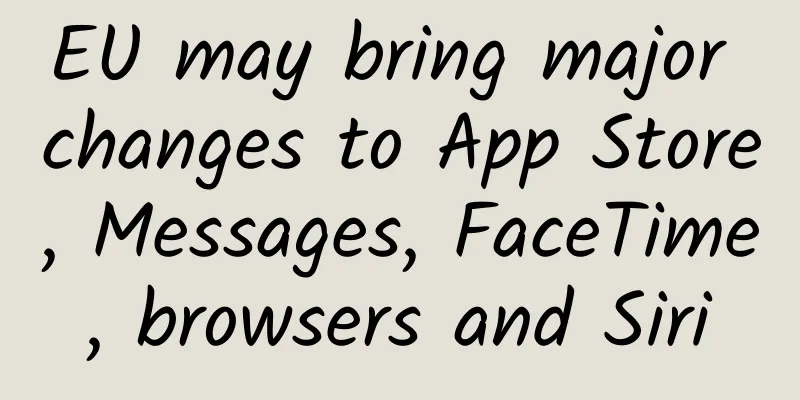EU may bring major changes to App Store, Messages, FaceTime, browsers and Siri

|
A leaked version of the EU's Digital Markets Directive (DMA) suggests Apple could be forced to make major changes to the App Store, Messages, FaceTime, third-party browsers and Siri.The European Union is planning changes that seek to have a major impact on how companies like Apple manage their products, apps and services in Europe, particularly with regard to "gatekeepers," according to a leaked working document purporting to reflect a "final" version of the DMA seen by MacRumors. An early version of the Digital Markets Act laid out requirements for big tech companies to share metrics with competitors, ensure all apps are uninstallable, and not favor their own apps and services. Companies that fail to do so could face huge fines of up to 10 percent of a company’s global annual turnover or even be fired. The DMA is focused on trying to force major changes to the App Store, forcing Apple to allow users to download apps from the internet and third-party app stores, and to allow developers to use the in-app payment system of their choice and promote offers to users. The DMA amendments outlined in the leaked documents seek to address issues of browser engine gatekeeping and platform interoperability. The document expands the terms to prevent companies from requiring developers to use a specific browser engine. This change is likely intended to directly address Apple's requirement that all browsers running on iOS and iPadOS must use its own WebKit technology and allow third-party browsers such as Chrome, Edge, Brave, and Opera to stop using WebKit and switch to Chromium like their desktop counterparts. The new broad interoperability obligations will require companies to ensure that their messaging, voice calling and video calling apps and services will work with rival services in certain circumstances and include end-to-end encryption. This could affect iMessage and FaceTime, but it's unclear to what extent Apple would need to change its services to meet the DMA's interoperability requirements. The DMA also made revisions to increase regulation of virtual assistants such as Siri, stating that users should have the option to change their default virtual assistant to a third-party option when they first use it. Other changes to the DMA involve preventing companies from giving their own apps and services preferential treatment, such as when presenting rankings or search results. EU lawmakers provisionally approved the DMA in March. Once the final document is officially published, the European Parliament and the Council will need to approve it before it can come into force. Digital competition chief Margrethe Vestager said last month that she expected the DMA to come into force "sometime in October." Earlier this week, members of the European Parliament voted overwhelmingly in favor of legislation that would force Apple to include USB-C ports on all iPhones, iPads, and AirPods in Europe. |
<<: 6000 words of practical information! A guide to development communication for designers
>>: Android 14 first exposure: flip the cake
Recommend
Are you laughing at Erha? He has been to the Olympics!
When people mention Huskies, they always associat...
Toyota seeks collaboration to meet future challenges
Recently, according to foreign media reports, Toy...
How to promote your products effectively?
In most cases, many people are easily influenced ...
Why do deep space probes circle before reaching their destination?
According to foreign media reports, the BepiColom...
The next stop for telecom operators: building Internet TV?
At present, the composition of the color TV marke...
Will Silicon Valley giants' enthusiasm for AR eliminate mobile phones in the future?
“If you take away one thing today,” Facebook CEO ...
A complete breakdown of the strategy for creating explosive products!
Ask a question I have come into contact with many...
Can the money tree really make you rich?
During the Spring Festival when fireworks are ban...
Office Winner: High Emotional Intelligence Communication 10 Lectures
"Office Winner: 10 Audio Lectures on High Em...
Is the Douyin likes task real? Will it be discovered by the system?
This article mainly introduces relevant informati...
Qinyang SEO Training: What should I do if the old website is not ranked high? What are the reasons?
In most cases, webmasters prefer to run a new opt...
13 Marketing Keywords for the First Half of 2021
2021 is already halfway through. Looking back at ...
What is the paid search effect? Here are four revelations for corporate promotion
"I know that half of my advertising expenses...
How much does it cost to develop a Zhongshan musical instrument mini program?
According to industry insiders, mini programs wil...
What does it mean to take medicine three times a day? Many people get it wrong!
Are you not taking your medicine? I mean, are you...









